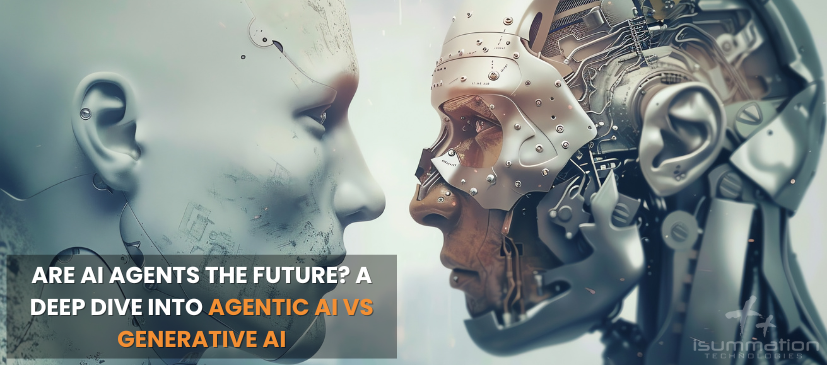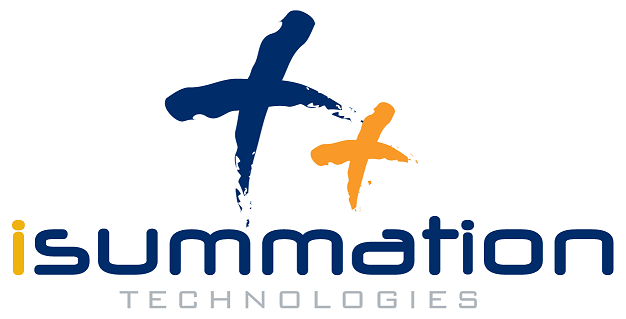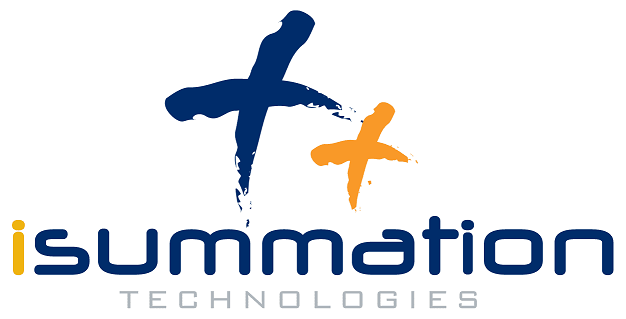- June 3, 2025
- Posted by: iSummation Team
- Category: Strategic IT

Artificial Intelligence (AI) is no longer a futuristic concept; it’s a reality that has been transforming industries worldwide. From chatbots to self-driving cars, AI’s capabilities have evolved rapidly, bringing forth different types of AI technologies that serve various purposes. Two prominent technologies in this ecosystem are agentic AI vs generative AI.
But what exactly is agentic AI? How does it differ from generative AI, and why are businesses increasingly leaning toward agentic systems? This blog aims to provide a comprehensive overview of these technologies, their applications in enterprise business solutions, and a closer look into whether agentic AI is indeed the future.
By the end, you’ll have a solid understanding of these two AI paradigms and the potential they hold for transforming business landscapes.
What Is Agentic AI?
Agentic AI refers to artificial intelligence systems developed with a specific goal orientation and the autonomy to make decisions and take actions to achieve those goals. Unlike basic or purely reactive AI, agentic AI doesn’t merely respond to user commands or preconditioned triggers. Instead, it actively plans, adapts, and executes tasks based on situational data and its programmed objectives.
Key Features of Agentic AI
- Autonomy
Agentic AI systems can operate with minimal or no human intervention. They are built to function independently while adhering to predefined guidelines.
- Goal-Oriented Problem Solving
These AI tools focus on achieving specific goals, whether it’s optimising business logistics, improving cybersecurity, or personalising customer experiences.
- Continuous Learning
Like humans, agentic AI constantly learns and evolves. It adapts to understand tasks better, making long-term improvements in performance.
- Contextual Awareness
Agentic AI systems are contextual. Unlike reactive AIs, these systems can adjust their actions based on changing environments or input.
Common Examples of Agentic AI in Action
- Self-Driving Cars
Agentic AI powers autonomous vehicles by allowing them to interpret road conditions, avoid obstacles, and decide optimal paths.
- AI-Powered Digital Employees
Virtual assistants like Amelia by IPsoft are examples of agentic AI tools capable of making decisions and solving problems in a business context.
- Cybersecurity Systems
Intelligent threat detection systems deploy agentic AI to proactively identify and neutralise risks.
What Is Generative AI?
Generative AI, on the other hand, focuses on creation rather than decision-making. It is designed to generate text, images, videos, music, or even software development code. This type of AI development company uses deep learning models to study massive datasets, recognise patterns, and produce content that mimics what it has learned.
Key Features of Generative AI
- Data-Driven Creation
Generative AI trains on vast datasets to produce new, original outputs based on statistical patterns.
- Ideation Support
It is widely used for augmenting creativity and brainstorming in creative industries, media, and marketing.
- Multimodal Capabilities
Tools like GPT (Generative Pre-trained Transformer models) can handle multiple modes of data, such as text, images, and more.
- Adaptability
Generative AI adapts content based on prompts, making it an effective tool for personalising outreach.
Agentic AI vs Generative AI
While both technologies are significant, they serve profoundly different purposes. Understanding both their distinctions and overlaps is crucial for businesses considering integrating AI into their workflows.
Core Differences Between Agentic AI and Generative AI
| Feature | Agentic AI | Generative AI |
|---|---|---|
| Functionality | Goal-oriented; decision-making based | Content creation based on data patterns |
| Autonomy | Highly autonomous | Requires user prompts to operate |
| Learning Style | Adaptive based on goals | Learns patterns in data |
| Applications | Cybersecurity, autonomous vehicles | Marketing, media, creative industries |
Use Cases Across Business Functions
1. Customer Service
- Agentic AI: Proactive customer support tools that autonomously resolve complaints and route complex issues to human agents.
- Generative AI: Drafting auto-responses, generating customer interaction summaries, and creating chatbot dialogues.
2. Marketing
- Agentic AI: Managing targeted ad campaigns and optimising performance in real-time.
- Generative AI: Content generation like social media posts, product descriptions, and creative ad copy.
3. Operations and Supply Chain
- Agentic AI: Using autonomous tools to improve logistics and reduce inventory inefficiencies.
- Generative AI: Enhancing reporting and predictive analysis for logistical planning.
Why Agentic AI Is a Game-Changer for Enterprises
While generative AI has captured public attention with tools like ChatGPT, agentic AI holds the most promise for enterprise businesses. Here’s why:
Operational Efficiency
Agentic AI allows enterprises to automate complex operational workflows with precision and consistency. From manufacturing to cybersecurity, organisations save time and resources while achieving higher efficiency.
Advanced Decision-Making
Businesses operate in fast-paced, unpredictable environments. Agentic AI empowers organisations with predictive insights and autonomous decision-making in high-stakes scenarios.
Competitive Edge
Companies leveraging agentic AI can outperform competitors through faster adaptation, enhanced efficiency, and customer-centric solutions.
Consider Microsoft, which has incorporated agentic solutions like its Agentic AI MS platform into enterprise productivity tools, helping businesses streamline their workflows seamlessly.
Challenges and Ethical Concerns in Implementing Agentic AI
Despite its potential, deploying agentic AI at scale involves challenges:
Cost: The development and implementation of agentic systems demand significant investment.
Bias in Decision-Making: Without proper oversight, bias in AI algorithms could amplify inequalities.
Governance: Lack of clear AI governance frameworks in most countries adds risk to adopting agentic systems.
Privacy Concerns: Autonomy in decision-making can jeopardise user and customer privacy if not cautiously managed.
Are Agentic AI Systems the Future?
The short answer is yes. Enterprises need systems that don’t just passively react but actively adapt to dynamic business needs. The autonomy and goal-oriented design of agentic AI address core challenges in decision-making, efficiency, and scalability. Companies like Tesla, Microsoft, and IBM have already positioned agentic AI tools at the heart of their operations.
Coupled with generative AI’s ability to create compelling customer-facing experiences, the synergy between these two paradigms makes for a holistic AI-powered business future.
Take the Next Step
If your enterprise is exploring ways to leverage AI, now is the time to consider both agentic AI and generative AI solutions. By doing so, you can enhance operations, connect deeply with customers, and drive innovation.
Still not sure where to start? Stay ahead of the curve by investing in agentic systems today.


